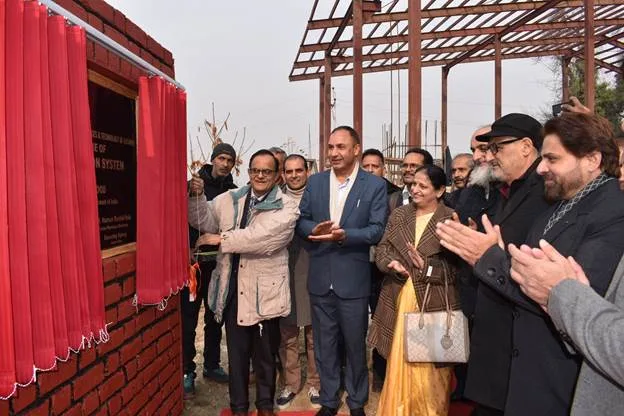New Delhi: e first annual review meeting of the Rural Technology Action Group (RuTAG) 2.0 projects was held on 5-6th December, 2024, at the Sher-e-Kashmir University of Agricultural Sciences and Technology (SKUAST), Srinagar, Kashmir. The meeting was chaired by Prof. Ajay Kumar Sood, Principal Scientific Adviser (PSA) to the Government of India.
The inaugural session, presided over by Prof. Sood as the Chief Guest, featured dignitaries including Dr. Parvinder Maini, Scientific Secretary, Office of the PSA; Prof. Nazir Ahmad Ganai, Vice-Chancellor, SKUAST-Kashmir, Shri Saurav Baghat, IAS, Commissioner/Secretary, Department of Science & Technology, Government of Jammu and Kashmir; Dr. Haroon Naik, Director of Research at SKUAST-Kashmir; Dr. Monoranjan Mohanty, Adviser, Office of the PSA; Dr. Hafsa Ahmad, Scientist, Office of the PSA; members of the Project Review and Monitoring Committee (PRMC), representatives from the RuTAG centres. along with several high-ranking State officials and industrialists.
The event began with the ceremonial laying of the foundation stone for an IoT-enabled fertigation system at SKUAST by Prof. Sood. Designed to enhance the efficiency of water and fertilizer use, this innovative system aims to promote sustainable and environmentally responsible farming practices.
The dignitaries also visited the Discovery Centre, where they observed research and technological advancements spearheaded by SKUAST-Kashmir. This was followed by a tour of innovative stalls demonstrating rural technologies developed by seven RuTAG centres, reflecting efforts to drive grassroots innovation and enhance rural livelihoods.
Prof. Sood also launched the official RuTAG logo, symbolizing a unified visual identity that strengthens communication and cooperation among stakeholders. In his address, Prof. Sood highlighted the transformative potential of technology in rural development, stating: “RuTAG reflects the government’s vision to empower rural communities through sustainable, high-quality innovations. By meeting global quality standards and sustainability benchmarks, we can unlock opportunities that uplift these communities and position them competitively on a global scale.”
During the proceedings, Dr. Parvinder Maini emphasized the need for scalable, sustainable, and commercially viable rural technologies, urging early collaboration with stakeholders to ensure greater adoption and impact, aligned with the mandate of RuTAG 2.0. She highlighted RuTAG’s role in bridging rural-urban disparities through innovative and context-specific solutions that empower local communities. She also highlighted the need to connect the S&T Clusters initiative, another flagship program of the OPSA, with the innovative technologies developed by RuTAG for probable commercialization through the clusters.
Prof. Nazir Ahmad Ganai echoed these sentiments, stating: “The university is deeply committed to advancing rural technologies through interdisciplinary collaboration, and we must scale grassroots innovations to effectively address community-specific challenges.”
Presentations on the progress of RuTAG 2.0 projects were delivered by all seven RuTAG centres, including RuTAG SKUAST-Kashmir, IIT Bombay, IIT Roorkee, IIT Guwahati, IIT Madras, IIT Delhi, and Indian Council of Agricultural Research -National Academy of Agricultural Research Management (ICAR-NAARM) Hyderabad. Prof. Ajay Kumar Sood, Dr. Parvinder Maini, and the PRMC provided feedback and recommendations to guide the future project activities of RuTAG 2.0 projects.
During the meeting, the RuTAGe Smart Village Centres (RSVC) Initiative from the Office of the PSA was also introduced, highlighting a vision to transform villages into economic hubs through the deployment of innovative, affordable, and context-specific technologies tailored to local needs.
This 2-day RuTAG meeting facilitated cross-collaboration for potential upscale of technologies, design improvements, use cases and further adoption of technologies in other areas of the country with similar local demands.
The event concluded with a strategic discussion on the future roadmap for RuTAG 2.0. In his closing remarks, Prof. Sood stressed the importance of scaling up RuTAG technologies to achieve broader societal impact and enhance the quality of life in rural areas.
The meeting convened 61 participants, including scientists, academicians, industrialists, state officials, and representatives from various RuTAG centres, marking a milestone in promoting technological innovation for rural development.


